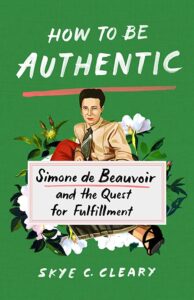By Skye C. Cleary Reviewed by Victoria Starr Marshall

After reading Skye Cleary’s article, “Simone de Beauvoir Recommends We Fight for Ourselves as We Age,” published in our summer 2023 issue, I was compelled to read her book. I also realized it would be perfect companion reading for this issue’s theme—looking at our lives as a work of art that we create, which is unique, personal, and authentically us.
Indeed, How to be Authentic stretched and challenged me, as I had not previously known much about the philosophy of existentialism. According to Cleary, Beauvoir’s view “is that we exist first—and then spend the rest of our lives creating—not discovering who we are.” And that “to be authentic is to live in pursuit of self-creation and self-renewal, with many different paths toward diverse goals.” And that our life consists of “projects.”
Bingo. Free to be me. Free to be the designer of my own life. Yet, with that freedom also comes responsibility to others and society’s greater good, and the recognition that due to sexism, systemic oppression, or actions of other individuals, many people don’t get to fully choose their life path. Still, we can all become more conscious of living purposely and responsibly and, importantly, acknowledge every person’s right to become “the poet of their own lives,” while advocating for those who are oppressed.
So, I get to be me, and you get to be you, too, if it is not hurting anyone. It’s a philosophy of individuality, tolerance, and of being free in the truest sense. Within this context—and the writings and philosophy of Beauvoir—Cleary tackles some of today’s most intractable challenges: Sexism, ageism, our response to climate change and the pandemic, and our vulnerability to narcissism, fascism, and even mysticism.
We can all be very good a deluding ourselves. In one fascinating chapter titled “Rebellion,” Cleary writes, “Beauvoir highlighted a number of mystifications and tensions that would be helpful to know as we embark on our quests to break oppressive bonds for ourselves and others.” She referred to one as “slack-tivism,” whereby people do enough to fit in, “but not enough to affect any meaningful change.” She gives hashtag trends as an example, such as posting #blacklivesmatter on Facebook, but never attending a rally: “These hashtag trends seem to be ultimately about self-promotion. They allow people to feel good about themselves, as though they are advocating for sexual or other justice, but in a way that centers their own reputation. The critical thing,” she continues, “is to move beyond slacktivism and turn awareness into advocacy.”
There is so much wisdom and challenge here— I could quote for pages. A better idea is to pick up the book and discover it for yourself. There’s no more perfect time than now to reach for authenticity.

